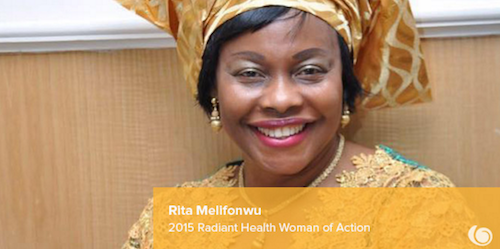Rita Melifonwu — A Champion for Stroke Care in Africa
The Radiant Health Women of Action is our list of inspiring women…

The Radiant Health Women of Action is our list of inspiring women taking action to improve the health and well-being of African communities, whether on the continent or in diaspora.
Rita Melifonwu’s passion, vision and hard work have ignited a chain reaction in the campaign to raise stroke awareness in Nigeria.
A stroke occurs in Nigeria every 80 minutes, with roughly 168,000 new incidences of the medical emergency each year. With each case comes a different but often predictable set of problems.
For Rita Melifonwu, the disease hits close to home. Her favorite aunt had a stroke while on the way to market in Onitsha and was unable to receive the necessary emergency care. At the same time, Melifonwu began noticing a trend while in her position as a senior nursing sister at a local hospital in the London area.
“I realized that black and minority ethnic people are more at risk of strokes than their white counterparts, and that the [black] stroke survivors and their family members were unaware of stroke risk factors or how to prevent strokes,” says Melifonwu. She quickly resolved to work for stroke advocacy and awareness.
Melifonwu’s passion only intensified when she won the U.K. Department of Health’s 1999 Mary Seacole Nursing Leadership Award, which allowed her to conduct research that led to Stroke Action UK, the prototype for Stroke Action Nigeria.
In 2013 the Nigerian Federal Ministry of Health (FMOH) signed an agreement with Stroke Action Nigeria to implement a national Power to Stop Strokes campaign, create a stroke reference group and registry for the country, pilot a Life After Stroke Centre in Abuja, and support stroke education and training for health care professionals, supported by the Medical Association of Nigerians Across Great Britain (MANSAG).
As confirmation of the program’s ongoing success, on September 15, 2015, President Mohammadu Buhari gave the Nigeria Stroke Reference Group (NSRG) the mandate to advise the FMOH on the development of quality stroke services in Nigeria.
Still, despite Stroke Action Nigeria’s success, traditional views in the country can sometimes become barriers to success.
“Sadly, some Nigerians still forsake conventional medications and treatment for cultural and religious reasons,” says Melifonwu. “My take has always been to let people know that God created all things and to each one He called to a ministry. Therefore, the manufacturers of medicines and clinical experts that offer medical and surgical interventions must be walking in the areas of their calling. People are getting healed every day and lives are saved as a result of the work that these people do.”
[MORE]: See All the 2015 Radiant Health Women of Action
